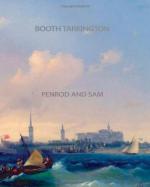Dressing, that morning, Penrod felt that the world was changed from the world of yesterday. For one thing, he seemed to own more of it; this day was his day. And it was a day worth owning; the midsummer sunshine, pouring gold through his window, came from a cool sky, and a breeze moved pleasantly in his hair as he leaned from the sill to watch the tribe of clattering blackbirds take wing, following their leader from the trees in the yard to the day’s work in the open country. The blackbirds were his, as the sunshine and the breeze were his, for they all belonged to the day which was his birthday and therefore most surely his. Pride suffused him: he was twelve!
His father and his mother and Margaret seemed to understand the difference between to-day and yesterday. They were at the table when he descended, and they gave him a greeting which of itself marked the milestone. Habitually, his entrance into a room where his elders sat brought a cloud of apprehension: they were prone to look up in pathetic expectancy, as if their thought was, “What new awfulness is he going to start now?” But this morning they laughed; his mother rose and kissed him twelve times, so did Margaret; and his father shouted, “Well, well! How’s the man?”
Then his mother gave him a Bible and “The Vicar of Wakefield”; Margaret gave him a pair of silver-mounted hair brushes; and his father gave him a “Pocket Atlas” and a small compass.
“And now, Penrod,” said his mother, after breakfast, “I’m going to take you out in the country to pay your birthday respects to Aunt Sarah Crim.”
Aunt Sarah Crim, Penrod’s great-aunt, was his oldest living relative. She was ninety, and when Mrs. Schofield and Penrod alighted from a carriage at her gate they found her digging with a spade in the garden.
“I’m glad you brought him,” she said, desisting from labour. “Jinny’s baking a cake I’m going to send for his birthday party. Bring him in the house. I’ve got something for him.”
She led the way to her “sitting-room,” which had a pleasant smell, unlike any other smell, and, opening the drawer of a shining old what-not, took therefrom a boy’s “sling-shot,” made of a forked stick, two strips of rubber and a bit of leather.
“This isn’t for you,” she said, placing it in Penrod’s eager hand. “No. It would break all to pieces the first time you tried to shoot it, because it is thirty-five years old. I want to send it back to your father. I think it’s time. You give it to him from me, and tell him I say I believe I can trust him with it now. I took it away from him thirty-five years ago, one day after he’d killed my best hen with it, accidentally, and broken a glass pitcher on the back porch with it—accidentally. He doesn’t look like a person who’s ever done things of that sort, and I suppose he’s forgotten it so well that he believes he never did, but if you give it to him from me I think he’ll remember. You look like him, Penrod. He was anything but a handsome boy.”




